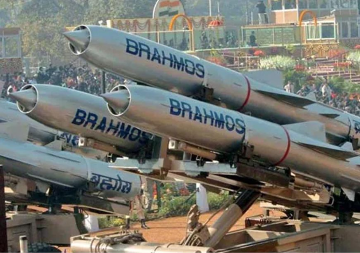
Successive governments of the United States (US), Japan, and South Korea have perceived a threat to their national security from North Korea’s nuclear-missile programme and sought to address it by denuclearising the peninsula. Since Joe R Biden Jr. took over the American presidency, Washington, Tokyo, and Seoul have come to focus on having a trilateral mechanism aimed at meeting this challenge.
The subject of North Korean denuclearisation occupied a prominent place in Japanese Prime Minister Suga Yoshihide’s summit talks with the United States President Joe Biden on 16 April 2021. Earlier, on 3 February 2021, in a call with South Korean President Moon, President Biden agreed to closely cooperate on North Korean denuclearisation and recognised the need for trilateral cooperation among the US, South Korea, and Japan to deal with North Korea.
The theme of North Korean denuclearisation was also on the agenda of Japan’s National Security Secretariat Secretary-General Shigeru Kitamura’s talks with his South Korean and US counterparts, Suh Hoon and Jake Sullivan respectively, in Annapolis, Maryland, on 2 April 2021. At Annapolis, they all agreed to prevent Pyongyang’s nuclear proliferation through concerted trilateral cooperation.
Kim’s calculus
At present, however, Pyongyang continues to be ambitious about its nuclear military programme. At the eighth Party Congress of the Workers’ Party of Korea (January 5th to January 12th, 2021), North Korean dictator Kim Jong-un described the “completion of the great cause of building a state nuclear force” as “of the greatest significance in national history.”
Kim declared that the North had already succeeded in completing a hydrogen bomb and successfully tested intercontinental ballistic missiles. He set out a plan to develop tactical nuclear weapons, submarine- and ground- launched solid fuel intercontinental ballistic missile (ICBMs), underwater-launched nuclear strategic weapons, hypersonic gliding flight warheads, nuclear-powered submarines, submarine-launched ballistic missiles, military reconnaissance satellites, and high-performance reconnaissance drones. Kim also demonstrated a desire to further develop nuclear weapons for “defensive purposes”.
The reasons for the North’s resistance to its denuclearisation are not difficult to assess. Kim believes the possession of nuclear weapons helps his regime secure the loyalty of officials and the North Korean people, and tighten its control over the country. He seems to calculate that it would prevent the world’s only superpower from ever considering any military options against Pyongyang. Besides, its nuclear military capability gives Pyongyang a military edge over its neighbours such as South Korea and Japan.
The reasons for the North’s resistance to its denuclearisation are not difficult to assess. Kim believes the possession of nuclear weapons helps his regime secure the loyalty of officials and the North Korean people, and tighten its control over the country
Also, the North may not have any alternative to its nuclear armament right now. The reality on the ground is North Korea cannot expect its old allies, Russia and China, to help it in its defence modernisation. Because of their relations with South Korea and the UN sanctions regime, they have refused to provide modern weaponry to Pyongyang. In this situation, nuclear armament does the job well without costing much. According to the World Military Expenditures and Arms Transfers 2019 report, Pyongyang today spends on its military ten times less that what Seoul does. North Korea’s military spending amounted to US $3.6 billion a year; it accounted for 13.4 percent to 23.3 percent of its GDP. In contrast, South Korea’s military spending stood at US $34.8 billion; that accounted for 2.6 percent of its GDP.
A way forward
Given the ground realities, one would suggest Washington, Tokyo, and Seoul could better devise a workable strategy to deal with Pyongyang. They could think of developing mechanisms that would give significant security assurances to the Kim regime and appeal to it to give up its nuclear weapons programme. Experience of the negotiations Washington had with Pyongyang in the recent decades, including during the presidencies of Barack Obama and Donald Trump, is that sanctions diplomacy does not work.
The three nations could, perhaps, offer North Korea improved relations, including sanctions relief, with themselves and persuade the latter (Pyongyang) to cease further nuclear weapons development and reduce the size of its nuclear arsenal. Such a modus vivendi may offer a win-win solution to all the parties concerned. Herein, the Kim regime is likely to find enough security guarantees for North Korea.
During his summit talks with former US President Donald Trump, dictator Kim Jong Un had already offered to discuss dismantling of the nuclear facility at Yongbyon in exchange for talks about “reciprocal measures” from the US side. The North had also agreed to freeze its ballistic missile tests. Pertinently, such a proposition may suit Japan well. Tokyo has been worried mainly about North Korea’s short-range ballistic missiles. It is well documented that Tokyo has always wanted Pyongyang to declare a moratorium on its short-range and medium-range ballistic missiles testing only. In 2002, former Japanese Prime Minister Junichiro Koizumi got then North Korean Chairman Kim Jong-Il to even agree to maintain a moratorium on missile launching. South Korean President Moon Jae-in can play an important role in the North’s denuclearisation. President Moon is held in high esteem in Pyongyang. It may be recalled that he was instrumental in developing a warm personal relationship between former US President Donald Trump and North Korean leader Kim, which led to their summit meetings on North Korea’s denuclearisation. During his summit with Moon in April 2018, Kim agreed to “work to realise the denuclearisation of the Korean Peninsula.” The North must be pleased today that Seoul under Moon refrained from making any statements on the situation of human rights in Pyongyang when Washington and its allies raised the issue in the United Nations (UN).
Opportune moment
The time is opportune for the talks on the North’s denuclearisation to go forward. The Kim regime in North Korea does not seem to be ruling out reopening negotiations with the United States. Recently, the Kim regime has come to acknowledge the Biden administration. Notwithstanding its bitter criticism of President Biden’s recent call for stern deterrence against North Korea’s nuclear programme, Pyongyang has not done anything in action to embitter further its relations with Washington. It has refrained from moving forward on its nuclear programme and continued to observe its self-imposed moratorium on nuclear and long-range ballistic missile tests.
The time is opportune for the talks on the North’s denuclearisation to go forward. The Kim regime in North Korea does not seem to be ruling out reopening negotiations with the United States
Possibly, Pyongyang is deeply concerned over its economy today. The sanctions regime is said to have hit its economy very hard over the years. The situation has taken a turn for the worse after the Kim regime imposed a strict border closure to protect itself from the coronavirus. The United States, Japan, and South Korea could reach out to North Korea and help it economically. Eventually, Pyongyang would be tempted to address their concern on North Korea’s denuclearisation.
The views expressed above belong to the author(s). ORF research and analyses now available on Telegram! Click here to access our curated content — blogs, longforms and interviews.




 PREV
PREV


